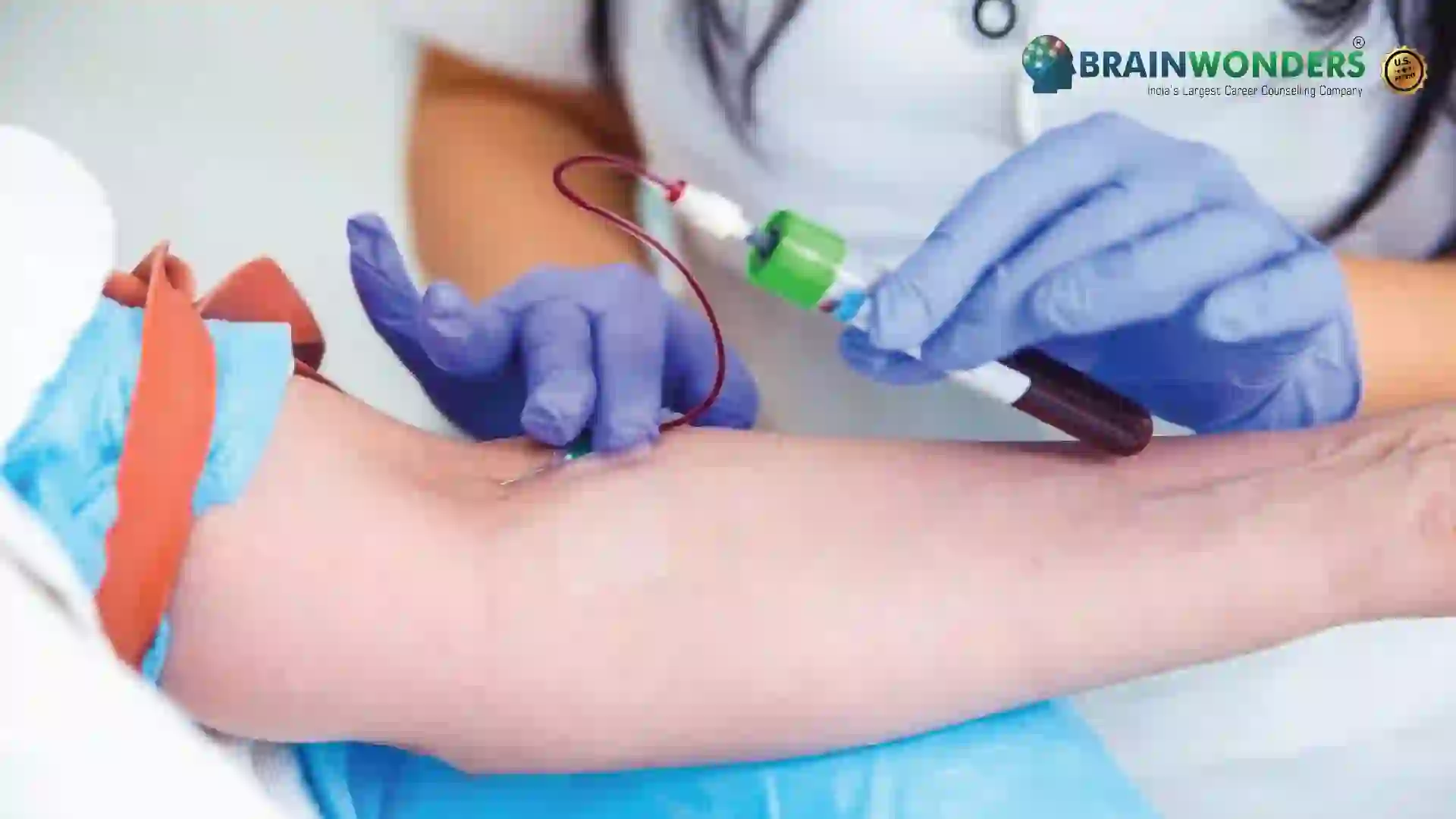How to become a Phlebotomist
Overview, Courses, Exam, Colleges, Pathways, Salary

Overview
Who is Phlebotomist ?
A Phlebotomist is a skilled healthcare professional who draws blood from patients for medical testing, donations, or transfusions. They are essential members of medical teams, ensuring accurate and safe blood collection. Phlebotomists follow strict procedures to identify patients, select appropriate veins, and handle blood samples properly. Their responsibilities include preparing patients, sanitizing equipment, and labelling samples. Phlebotomists may work in hospitals, clinics, diagnostic laboratories, blood donation centres, and other healthcare settings. They are crucial in disease diagnosis, monitoring, and research, contributing to patient care and public health. Effective communication and a compassionate approach are essential as they interact closely with patients, helping alleviate anxiety and ensure a positive experience during blood collection procedures.
Typical day at work
What does Phlebotomist do?
- Ensure one-time use of needles or syringes and dispose the contaminated instruments after use
- Ensure sanitization and sterilization of blood-drawing trays
- Using vacuum tube, syringe, or butterfly venipuncture process to draw blood from veins
- Matching laboratory requirement forms to specimen tubes and correctly label the samples
- Blood or other bio-hazard products or tissues disposal in compliance with relevant rules, guidelines or policies
- Administer blood alcohol, blood culture, drug levels, etc. testing
- Collect specimens for analyses, such as those measuring therapeutic drug levels at different time intervals
- Forward the test sample results to physicians to make diagnosis
- Input patient, test sample, insurance, or accounting information into database
- Extract blood from capillaries by using dermal puncture procedure like heel or finger stick techniques
- Administer haemoglobin checks for acceptable levels of iron of the donor
- Appropriately store and transfer blood, urine, fluid, and faecal specimines to laboratories from collection sites
- Take fluid or tissue samples, using correct collection methods
- Supervise and mentor other medical staff in techniques of phlebotomy
- Under doctor’s instructions, administer saline flushes or dispense anticoagulant drugs using intravenous (IV) lines
- Perform subcutaneous or intramuscular injections
- Extract blood from arteries using techniques for arterial collection
- Oversee blood or plasma donors throughout the process to safeguard their health, safety, and comfort
- Assess the suitability of donor based on interview, vital signs, and medical history
- Calibrate and maintain plasma collection and other machines
- Provide refreshments to donors to confirm sugar absorption into their system
- Conduct blood pressure, pulse, and respiration rate assessments of the patients
- Prepare stains and reagents
- With children create distractions and use smaller needles
- Explain the procedure to patients
- Draw blood into a tube by inserting a hypodermic needle
- Smear dressing on the needle puncture
- Verify identity of the patient or donor to confirm accurate sample testing and labelling.
Abilities and Aptitude needed
What are the skills, abilities & aptitude needed to become Phlebotomist?
Along with understanding how to operate and set up complex laboratory machinery, Phlebotomists should value precision and be comfortable working with equipment, like needles which require careful monitoring. They need knowledge in anatomy and blood collection procedures. Understanding electronic medical health records and having basic computer skills are advantageous.
They must strictly adhere to all directions for the tests or processes to be carried out appropriately. They must have good hand-eye coordination and work intimately, safely, and successfully with needles, chemicals, and other laboratory tools. Thus, good hand-eye coordination and fine motor skills are necessary.
They must also practice all standard safety procedures and quality control principles in the laboratory and understand and abide by legal and health care procedures.
Phlebotomists need to be well-organized, have observation skills, and be detail-oriented to conduct procedures with accuracy and precision.
They must be able to use logical reasoning, critical thinking, and problem-solving abilities, as well as sound reasoning and judgement.
They must be able to successfully communicate both vocally and in writing and have interpersonal skills. Phlebotomists need to be understanding and compassionate about the patient’s anxiety and fear of needles; thus, phlebotomists must possess empathy to put the patient at ease.
Salary
Salary for Phlebotomist?
Salary of a Phlebotomist is as follows :
- Minimum Monthly Salary: Entry-level phlebotomists may earn a minimum monthly salary ranging from INR 12,000 to INR 18,000. These positions are typically for individuals starting their careers, working in healthcare facilities, or assisting experienced phlebotomists.
- Maximum Monthly Salary: Highly experienced and specialized phlebotomists, especially those in supervisory roles with advanced certifications or expertise in specific areas like pediatric or geriatric phlebotomy, may earn a monthly salary ranging from INR 25,000 to INR 50,000 or more. Compensation can vary based on factors such as location and employer type.
- Annual Salary: The annual salary for entry-level or junior phlebotomists could be around INR 1,80,000 to INR 2,50,000. As phlebotomists gain more experience, take on leadership roles, and demonstrate proficiency, their annual income can increase from approximately INR 3,60,000 to INR 6,00,000 or higher.
- Highest Paying Jobs and Scope: Specialized areas such as research institutions, diagnostic laboratories, and hospitals often offer higher earning potential due to the demand for skilled phlebotomists in these settings. Phlebotomists working with advanced medical technologies, specialized patient populations, or in high-demand locations may also command higher salaries. Additionally, phlebotomists who pursue advanced certifications and demonstrate expertise in complex procedures may have enhanced earning opportunities. The scope for phlebotomists is promising as the healthcare industry continues to require accurate and efficient blood collection for diagnostics, medical research, and patient care.
Pathways
How to become an Phlebotomist?
Entrance Exam
Entrance Exam for Phlebotomist ?
Courses
Which course I can pursue?
Best Colleges
Which are the best colleges to attend to become an Phlebotomist?
Industries
Which Industries are open for Phlebotomist?
Phlebotomists play a crucial role in the healthcare industry by specializing in blood collection, processing, and handling. They are essential members of medical teams and find opportunities in various healthcare settings. Here are some industries and sectors where phlebotomists can work:
- Hospitals and Medical Centers: Hospitals are one of the primary employers of phlebotomists. They collect blood samples for various medical tests, procedures, and patient care.
- Diagnostic Laboratories: Clinical laboratories rely on phlebotomists to collect blood specimens for testing, a critical step in disease diagnosis and monitoring.
- Blood Donation Centers: Phlebotomists play a key role in blood donation centres by collecting blood from donors and ensuring the safety and availability of blood products for medical use.
- Outpatient Clinics: Medical clinics, outpatient facilities, and healthcare centres employ phlebotomists to collect blood samples from patients for various medical purposes.
- Urgent Care Centers: Phlebotomists in urgent care settings help collect blood for immediate testing and diagnosis.
- Long-Term Care Facilities: Nursing homes, assisted living facilities, and rehabilitation centres may employ phlebotomists to provide blood collection services for elderly or long-term care patients.
- Research Institutions: Phlebotomists are needed in research settings to collect blood samples from study participants for medical research and clinical trials.
- Public Health Agencies: Public health organizations may employ phlebotomists for community health screenings, disease surveillance, and public health initiatives.
- Physician's Offices: Many doctor's offices require phlebotomists to collect blood samples for routine check-ups and diagnostic processes.
- Home Healthcare Services: Some home healthcare providers send phlebotomists to patients' homes to collect blood samples for testing and monitoring.
- Mobile Phlebotomy Services: Phlebotomists may work for mobile services that travel to different locations, such as workplaces or community events, to perform blood draws.
- Medical Research Facilities: Research organizations and institutions employ phlebotomists to support various research projects involving blood samples.
- Blood Testing and Diagnostic Companies: Companies specializing in blood testing and diagnostics may hire phlebotomists to ensure accurate sample collection.
- Phlebotomy Training and Education: Phlebotomists can also work in educational institutions, teaching and training future phlebotomy professionals.
- Health and Wellness Clinics: Wellness centres, weight loss clinics, and health screening services may employ phlebotomists to collect blood.
internship
Are there internships available for Phlebotomist?
Phlebotomy internships provide practical training and experience for individuals pursuing a career as phlebotomists who specialize in drawing blood samples for medical testing and donation. Here are some potential places where phlebotomy internships might be available:
- Hospitals and Medical Centers: Interning at hospitals allows you to work under the supervision of experienced phlebotomists, gaining hands-on experience with a diverse range of patients and medical conditions.
- Diagnostic Laboratories: Clinical laboratories that perform blood tests and analyses often offer internships to train individuals in proper blood collection techniques and lab procedures.
- Blood Donation Centers: Organizations like the American Red Cross and other blood banks provide internships for phlebotomy students to learn about blood collection, donor screening, and processing.
- Outpatient Clinics: Medical clinics and outpatient facilities may offer internships to help students learn phlebotomy techniques in a clinical setting.
- Research Institutions: Some research facilities require phlebotomists to collect blood samples from study participants for research purposes. Interning in such settings exposes you to both phlebotomy and research processes.
- Nursing Homes and Long-Term Care Facilities: These settings might offer internships where you gain experience working with elderly or chronically ill patients.
- Health and Wellness Centers: Gyms, wellness clinics, and rehabilitation centres may offer internships for phlebotomy students to learn about health assessments and blood sample collection.
- Public Health Organizations: Government health departments and public health initiatives may have internships focused on community health screenings and blood testing.
- Phlebotomy Schools and Training Centers: Some educational institutions that offer phlebotomy training programs may have internal internship opportunities to provide practical experience.
- Mobile Phlebotomy Services: Companies that offer mobile phlebotomy services might have internship positions that involve travelling to patients' homes for blood collection.
- Veterinary Clinics: In some cases, veterinary clinics offer internships where you learn to collect animal blood samples.
Career outlook
What does the future look like for Phlebotomist?
The future for Phlebotomists is promising, with continued demand driven by evolving healthcare needs. As medical diagnostics and testing remain essential, Phlebotomists will play a vital role in collecting accurate blood samples. With technological advancements and point-of-care testing, their expertise will be increasingly valuable. Additionally, opportunities in specialized fields like research, genetics, and telemedicine may arise as the healthcare industry expands and diversifies. While automation could impact routine tasks, Phlebotomists will remain indispensable for patient interaction and ensuring quality samples. Continuing education and adaptability will be crucial to stay current with changing practices and technologies, ensuring a steady and rewarding career path.



.webp)


